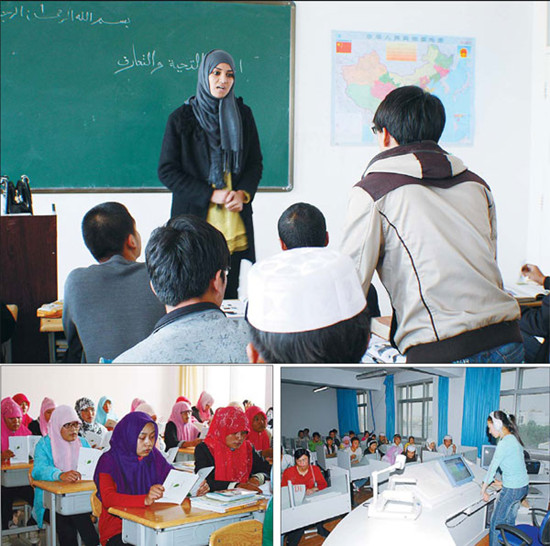
Tunisian teacher Nabila Ahmed (pictured) and her sister Ghada are among the three foreign teachers at Ningxia Muslim International Language School (top). The school has more than 1,200 students, most of whom are from the Hui ethnic group (above left). Tongxin Arabic School helps local youths secure better jobs in developed areas (above right). Photos provided to China Daily
Students in the Ningxia Hui autonomous region are taking advantage of their Muslim background to do business with the Middle East.
In Northwestern China's Ningxia Hui autonomous region, Muslims find knowledge of the Arabic language not only useful in prayers, but also helpful to secure jobs.
"I'm glad that my study in Arabic language enables me to engage in international trade, which I really like," says Ma Xu, 23, a graduate of the Tongxin Arabic School who now works for a Palestinian company in Yiwu, East China's Zhejiang province.
Tongxin, the Chinese county with the largest population of Hui Muslims, is located in arid central Ningxia. Like most people in the poverty-stricken region, Ma felt at a loss about what to do after finishing middle school. While the possibility of finishing high school and getting into university was flimsy, becoming a migrant worker with no special skills did not promise much of a future.
He chose to go to the Tongxin Arabic Language School. His earlier learning of the Arabic alphabet, when his grandfather taught him the Quran, helped him to pick up the language quickly.
In the third year of Arabic school, Ma went to Yiwu to intern at a trade company. He liked it and decided to stay in the city. "There are so many alumni in Yiwu. We have online chat groups, and help each other to find jobs," he says.
Apart from female students who do not want to work away from home, most of Ma's classmates end up in Yiwu or Guangzhou, the two largest bases of small commodities trade in China.
Businessmen from the Middle East make up a large portion of the people who come to shop for small commodities in wholesale, and Arabic interpreters are in high demand. In Yiwu and Guangzhou, most of the Arabic translators are Hui Muslims from Northwestern China, especially Ningxia.
Arabic businessmen buy not only daily necessities like clothes and shoes, but also religious items like beads and audio players of the Quran, which are made in China but find big markets in the Middle East.
Ma's work includes helping clients with goods purchase, business transactions and customs declaration.
Ma says the job was difficult at first, because people from different Middle Eastern countries speak various dialects of Arabic, but says he became adept at practical dialogue in Arabic within a few months.
Many Chinese people with Arabic language skills start as interpreters, and later open their own companies to do international trade with Arabic countries. "When I have enough experience and clients, I will do that too," Ma says.
Tongxin Arabic Language School is China's first public medium-level Arabic language school, founded in 1985. The number of students it enrolls annually has grown from 20 to 200.

Copyright ©1999-2011 Chinanews.com. All rights reserved.
Reproduction in whole or in part without permission is prohibited.